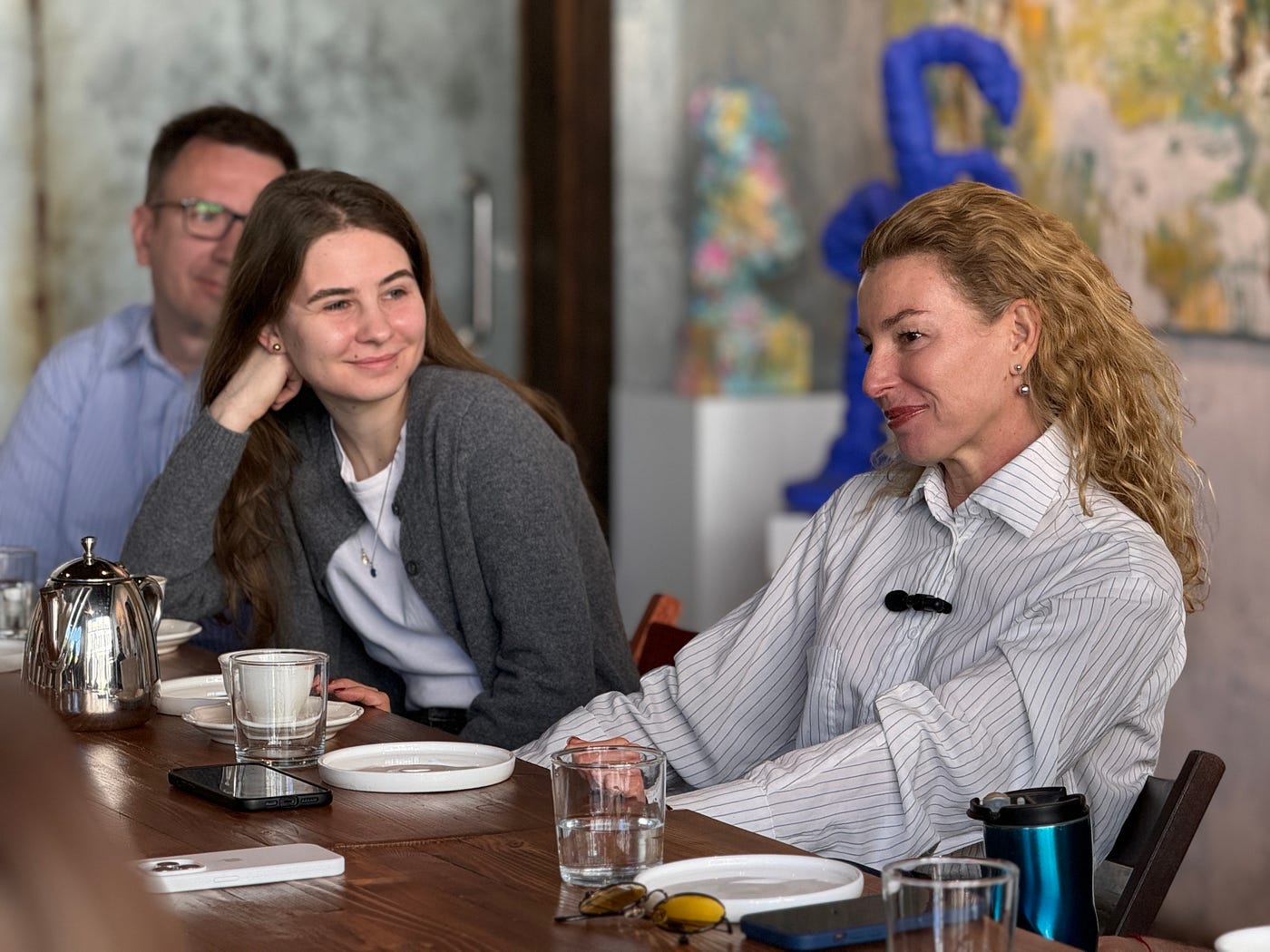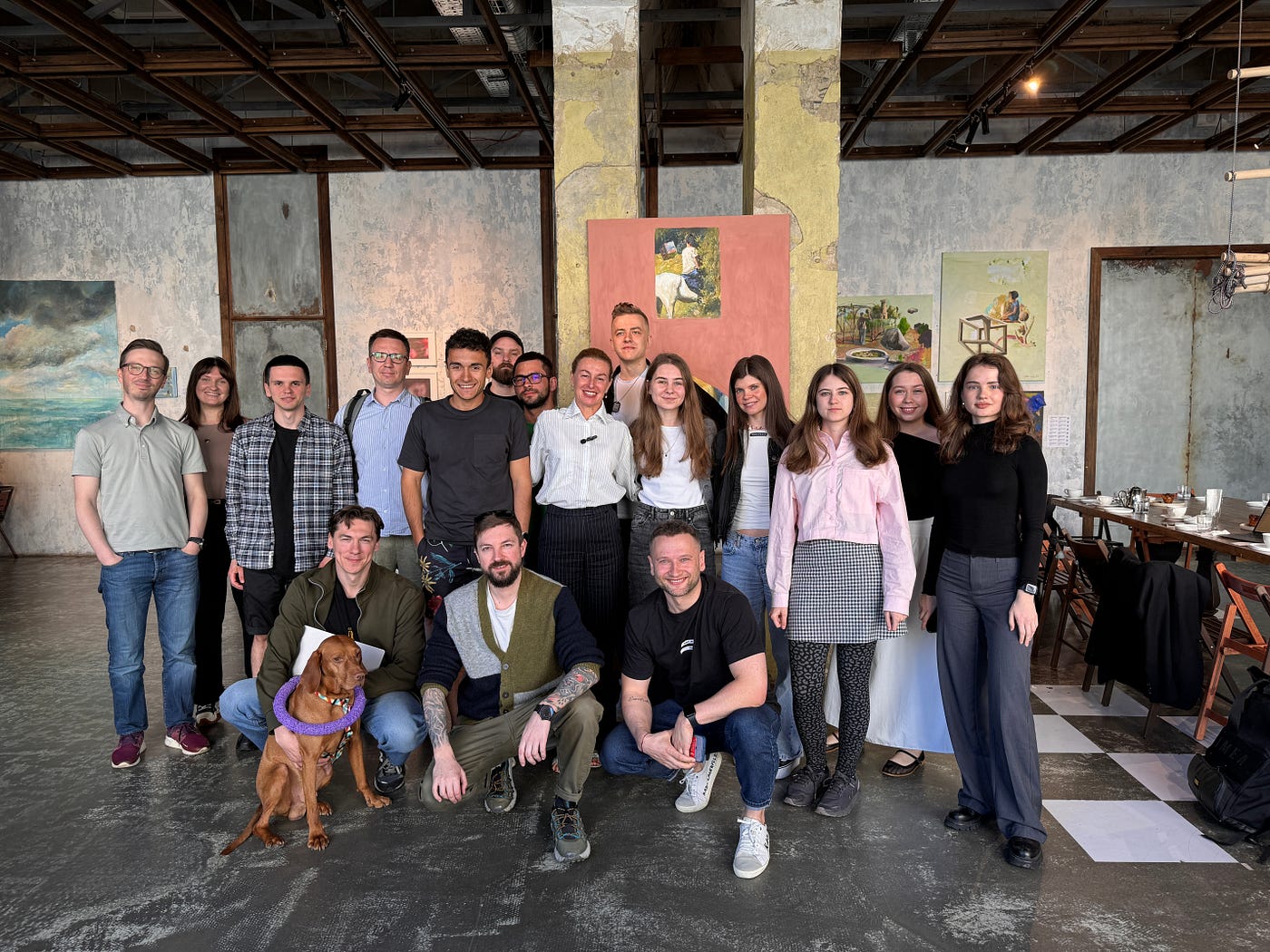May 6, 2024
August 16, 2025
As part of the Mission Possible venture-building program, we hold weekly business breakfasts for the cohort, where experts, tech leaders, and investors gather to discuss current topics and challenges in the technology and innovation sector over a cup of coffee. Recently, we had the honor of inviting
Eveline Buchatskiy, who is a managing partner at the D3 Defense Tech Fund.

Eveline’s story begins in Salvador, Brazil, a city known for its active carnival and beach lifestyle, which contrasts starkly with her determination. From an early age, Eveline Buchatskiy was deeply immersed in learning, even spending holidays copying encyclopedias. This drive led her to choose the path of chemical engineering. But strikes and disorder in Brazilian universities prompted her to make a radical decision — to get an education in the USA. Despite the skepticism of everyone around her, her determination led to her admission to UC Berkeley.
Eveline’s Advice 1: “Don’t be afraid to cause doubts and argue. When everyone says your idea is unfeasible, it might be the very moment to prove the opposite.”
After 10 years of being a chemical engineer, Eveline decided to transition from engineering to management. The French business school INSEAD helped me broaden my horizons and prepare for work in various fields without specialized experience.
Insight from Eveline 1: “Education at a top business school can radically change your view of the world and help you see new opportunities in your career.”
Eveline never stopped looking for new opportunities, so she moved to Ukraine after the Orange Revolution. Despite the initial shock, Eveline’s decision to move was prompted by a series of “crazy decisions” that she never regretted and ultimately considers her relocation to Kyiv the best decision in her life. This step marked a significant turning point in her life. She received an offer to be the CEO of a deeptech company specializing in ultracapacitors, where she was also considered a co-founder. Despite having no prior experience as a CEO, Eveline accepted the challenge, guided by her affinity for technology. Facing toxic investment practices, she highlighted the challenges posed by local investors, referred to as “angel devils”, who demanded disproportionally large stakes in startups for minimal investment, hampering growth and innovation.
Eveline highlighted the global opportunities available to Ukrainian startups, encouraging early-stage founders to seek fair and supportive investments from international sources.
Eveline’s Advice 2: “If you have not raised money yet and you’re about to, do not take money from these angels. The world has flattened now. You can have access to any investor across the globe.”
Later joining a large media company in Ukraine, Eveline faced the challenge of resolving its financial problems. Despite having no experience in the media industry, she used her skills acquired in business school. The company was losing about $300,000 a month, and Eveline set a goal to reach breakeven and leave the company. Spoiler: that’s exactly what happened. But what methods were used?
After leaving the media industry, Eveline founded an accelerator called eastlabs. “It’s time to do something a little bit more meaningful,” Eveline says.
This step was her first experience as an investor, and her first investment was the Ukrainian startup Preply. While working at eastlabs, Eveline invested in 19 companies, going through all possible ups and downs in the development of startups.
Political upheavals in Ukraine during the Maidan revolution led to new challenges that resulted in the cessation of local investments. During this period, Eveline was invited to become the director of Techstars in Boston. During this time, she invested in over 50 companies, expanding her influence and experience in the global startup ecosystem.
After which, Eveline joined Airslate, focusing on scaling the company. Each year they grew by 54% and hired 70–80 people every month.
Eveline’s Advice 3: “Invest in people. Technologies change, but the potential and passion of the team are key to the success of any startup.”
The next stage in Eveline’s life was a calling to use her experience for a greater cause — supporting Ukraine’s defense capabilities through technological investments.
She launched a fund dedicated to investing in military technologies used on the front line. Despite having no experience in the defense sector, her fund quickly became the most active in defense in Europe.
“And again, one more crazy thing. I have no experience in defense. I launched the fund in July of last year and have already invested in 10 companies.”
Eveline’s ultimate goal is to establish Ukraine as a leading global center for defense technologies, with a special emphasis on drone technology.
For those who wish to join the defense sector, without experience working in the industry, Eveline recommends attending and participating in hackathons or other public technology events, as a way to find connections and enter the industry.
For founders who have several co-founders and are looking to raise funds, Eveline recommended keeping capital dilution between 5% and 10% in the early stages to maintain control and flexibility.
It is necessary to think strategically about the amount you need to raise and the milestones you intend to achieve with this funding. For example, a startup may need a certain amount to hire employees and achieve key goals, which will then allow them to raise subsequent funding rounds at potentially higher valuations.
💡Three things to remember:
With the advent of global connectivity, Ukrainian entrepreneurs should not be afraid to turn to international funds and investors, this can create a competitive environment that can potentially lead to better valuations and conditions.
Eveline’s Advice 4: “Always think globally. Don’t limit yourself to local investors when you can attract the attention of global funds.”
But remember that financing is not the only component of a startup’s success. A startup requires comprehensive support, including access to business development, financial planning, and operational management.
This comprehensive support, which helps startups successfully navigate the early stages of growth and scale effectively without being overly reliant on funding at the expense of capital, can be crucial for maintaining control and flexibility in business decisions.
In our discussions with the cohort of the Mission Possible, Eveline emphasized the importance of having a long-term vision.
“I like to see the entrepreneur have some level of vision of scalability, that goes beyond your first product.”
Think big — start with a focused, niche proposition, but with a clear path to broader applications. This balance between meeting immediate needs and planning for future growth is important for long-term success, especially in technology-oriented sectors.
“You need to start with your little last mile targeting. Yeah, that’s your little thing that doesn’t scale much. But then you go to your grand vision”.
At this breakfast, Eveline Buchatskiy not only demonstrated a deep understanding of the investment process, but also a desire to develop the Ukrainian technology sector. Learning from leading experts, experimenting, and implementing innovations — this is the mission each participant of the venture program Mission Possible strives to fulfill.

The Center of Innovation and Entrepreneurship /nnov8 created the Mission Possible program with the support of the Western NIS Enterprise Fund and u.ventures in partnership with the Saïd Business School, University of Oxford.